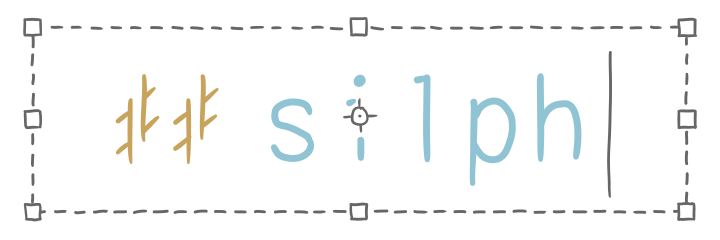NaNoWriMo
Although I’ve been doing creative writing since early high school, it was around HSC times that I discovered NaNoWriMo. I’m not sure exactly how, but I’m presuming it’s through a novel writing guide I borrowed from my local library. It recommended a program called Scrivener, which only existed on the Mac at that time. Looking up the program on the internet, a fair amount of search engine results mentioned NaNoWriMo.
There was no way a high schooler would’ve been capable of writing 50k words at a crucial point in time for the HSC, so I really only gave it serious thought in uni.
Every year since 2014 I’ve participated in some way. The kind of work I was doing during some of the years made it impossible to reach the full target, so I compromised by doing half.
| Year | About | Story Gist/Pitch |
|---|---|---|
| 2014 | Story | Ghost-transforming teenage boy works with a blade-wielding mutant young girl to thwart a digital terrorist group responsible for their near death |
| 2015 | Concept | Attempting to explain the “science” of zombies by following the lives of a schoolboy who’s affected by one and a prodigy doctor experimenting at the school he goes to |
| 2016 | Concept | What if popularity could be weaponised in the non-physical realm of thought? A schoolboy with online fame, tired of his popularity, is subject to this experiment |
| 2017 | Story, based on a game idea, half | A boy obtains a mysterious gadget from his missing father that would change the way he interacts with the technologically enhanced metropolis he lives in |
| 2018 | Concept, half | Instead of exorcising spirits forcefully, what if they did the opposite? A man risks the dangers of the paranormal to help a spirit out, even letting her possess him to help bring her 330-year case to a conclusion |
| 2019 | Concept, half | A strange particle has the properties of a ‘mind virus’, causing those affected to lose intelligence. A containment zone was established, and those who ‘disqualified’ are left to survive, success dependent on how smart they are |
| 2020 | Concept, based on a game idea, half | A girl with a terminal illness is given a second life – but to live, she relies on a mysterious source of energy, and can apply patches to her skin that grant her abilities |
| 2021 | Concept | In a modern technological urban fantasy, grudges between races are a thing of the past and everybody mostly gets along. In a leading tech company, a human in programming (mostly full of gnomes) musters up the courage to finally chat to his desk neighbour, an elf of little words who works in design |
| 2022 | Concept | A laid back student severely underestimates a meek classmate’s opinion that high school is life’s most highest-stake, zero-trust competition |
Takeaways from NaNoWriMo
Non official participation
Just to be clear, I don’t actually sign up to the website, so I’m oblivious to the community, which seems to be a major feature of the event. Perhaps this is why I’m content with being able to just set a goal and write, and not be distracted or pressured. It’s just me, my iPad, and my spreadsheet, almost quite literally.
Word counts and verbosity
50,000 words is, after all, an average of 1,667 words every day.
Don’t underestimate how much that is: unless you happen to have planned out exactly what you want to write from start to finish and you had a whole day to work on it – not a few hours after every workday – this is actually pretty difficult.
As a result of always needing to meet word targets, I’ve noticed the waffling and long-winded tangents creep into my everyday conversations. You might even notice it with the content I write here.
The spreadsheet
I love being able to visually see in real time what my progress is, so I put together a spreadsheet where I can enter in my information, and it’ll spit out stats like
- Written/time % progress (i.e. day 15 = 25,000 = 50%)
- Time progress in equivalent words (i.e. day 1 = supposed to be at 1,667)
- Words/hours ahead/behind of target (i.e. 26,000 at day 15 = +1,000 = +14h 24m)
- Custom target progress, so along with the standard 1,667 it can also calculate the above with some other value. This was how I managed to finish 2021 in 20 days because I set a daily goal of 2,500[1]
- Plan down each act and/or chapters’ word counts for pacing
Plan the idea
Planning the story in its entirety well before the month arrives will ease the stress involved. This applied especially in 2022 where I had an idea that sounded great, but actually ran out of juice really early on. There were some parts I really struggled to think of content for (like, 200 words a whole day kind of struggle).
I mitigated that problem by allowing myself to not be obliged to write from start to finish[2], and rather in the order that inspiration comes to me, which has helped a little. However, most of this inspiration tends to end up being side stories that don’t contribute to the original intent.
The reason for that? I didn’t have that underlying plan ready.
Revising the draft
I don’t do this. What I do instead is pick out the best parts, polish them up, and maybe share it with my friends.
Most of my current goals with creative writing is master my style of voice, and I often find myself not needing the full story package to demonstrate this.
It’s not just November
At my old workplace, I spun up a channel on Slack called #creative-jams. The idea was that you’d spend a hard maximum of one hour, every day, doing something. For me it was prose, but others have used this opportunity for poetry, drawing, music, knitting, cooking (a fair point, although I’d personally call this a cop-out), or even puzzle-making.
It’s purpose is to maintain a habit, and also hard capping it so it doesn’t eat into too much of your everyday life. Also, to reinforce that it takes practice to get good at something, just like playing any sort of game requires.
Hah, okay, fine... justwritemore.jpg
[1] Also because the theme I went with was a lot easier to write about. Gnomes in tech support talking shit about tech-unsavvy orcs during lunch break. The human protagonist showing a newly graduated OL elf intern the ropes. There was a lot going on there.
[2] Obligatory reference to Yoko Taro’s method of writing by starting at the end. That said, you could also try starting with a desired emotion, or something completely different.

